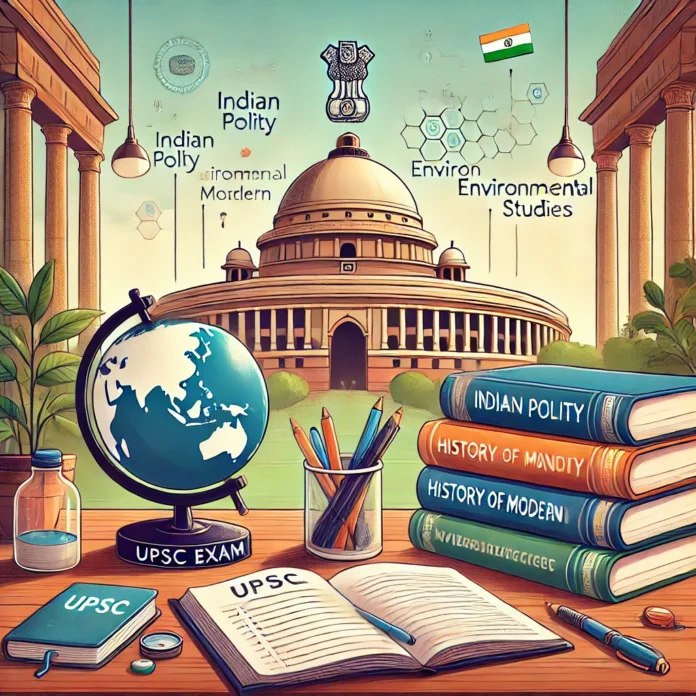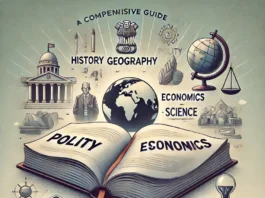The Union Public Service Commission (UPSC) conducts the Civil Services Examination (CSE), one of India’s most prestigious and challenging competitive exams. It is the gateway to elite administrative positions such as the Indian Administrative Service (IAS), Indian Police Service (IPS), Indian Foreign Service (IFS), and other Group A and Group B services. Every year, lakhs of aspirants compete for a few hundred coveted positions.
Structure of the UPSC Exam
The UPSC CSE is a three-stage examination designed to assess candidates on various aspects, including knowledge, analytical skills, and personality.
1. Preliminary Examination (Prelims)
• Purpose: Serves as a screening test for the Main Examination.
• Components:
• Paper I (General Studies – GS): Tests knowledge of Indian History, Geography, Polity, Economy, Environment, Science, and Current Affairs.
• Paper II (CSAT): Tests comprehension, logical reasoning, analytical skills, and basic numeracy. This paper is qualifying, requiring 33% marks to pass.
• Nature: Objective (Multiple Choice Questions).
• Marks: Total of 400 marks (200 marks per paper).
2. Main Examination (Mains)
• Purpose: Evaluates in-depth knowledge and understanding of various subjects.
• Components: Nine descriptive papers, of which two are qualifying.
• Qualifying Papers: Indian Language (Paper A) and English (Paper B).
• Merit-Based Papers: Essay, four General Studies papers, and two Optional Subject papers.
• Marks Distribution: Total of 1750 marks.
• Subjects Covered: Includes topics like ethics, governance, international relations, environment, and an optional subject chosen by the candidate.
3. Personality Test (Interview)
• Purpose: Tests personality, communication skills, ethical standards, and overall suitability for public service.
• Marks: 275 marks.
• Focus Areas: Leadership qualities, decision-making abilities, and presence of mind.
Eligibility Criteria
To apply for the UPSC CSE, candidates must meet the following eligibility requirements:
• Nationality:
• Must be an Indian citizen for IAS and IPS.
• For other services, specific criteria apply.
• Educational Qualification:
• A bachelor’s degree from a recognized university is mandatory.
• Age Limit:
• General category: 21 to 32 years.
• Relaxations apply for OBC, SC/ST, and other categories.
• Attempts:
• General category: 6 attempts.
• OBC: 9 attempts.
• SC/ST: Unlimited attempts within the age limit.
Syllabus Overview
The UPSC syllabus is vast and encompasses a wide range of topics:
• General Studies (Prelims and Mains):
• Indian History and Culture
• Geography of India and the World
• Indian Polity and Governance
• Economic and Social Development
• Environment and Ecology
• Science and Technology
• Current Affairs
• Optional Subjects: Includes a choice of over 25 subjects such as Literature, Sociology, Mathematics, and Public Administration.
• Ethics, Integrity, and Aptitude: A dedicated paper focusing on ethical and moral values.
How to Prepare for the UPSC Exam
Here are some tips to effectively prepare for the UPSC exam:
1. Understand the Syllabus:
• The syllabus is your guide. Break it into manageable sections for focused study.
2. Plan Strategically:
• Create a detailed study plan covering Prelims, Mains, and the Interview.
3. Study Standard Resources:
• Start with NCERTs for foundational knowledge, and then move to advanced books.
4. Stay Updated:
• Regularly follow newspapers like The Hindu or Indian Express and magazines like Yojana for current affairs.
5. Practice and Revise:
• Solve previous years’ question papers and take mock tests regularly.
6. Develop Writing Skills:
• Mains is a descriptive exam, so practice writing clear and concise answers.
Clearing the UPSC exam opens doors to a career that is impactful, prestigious, and rewarding. Civil servants play a critical role in shaping public policy, ensuring governance, and driving national development.
The UPSC exam is not just a test of knowledge but also a test of perseverance, determination, and adaptability. While the path is challenging, the rewards of serving the nation in high-impact roles make the journey worthwhile. If you’re ready to dedicate yourself to this mission, the UPSC exam could be your gateway to a fulfilling career.




